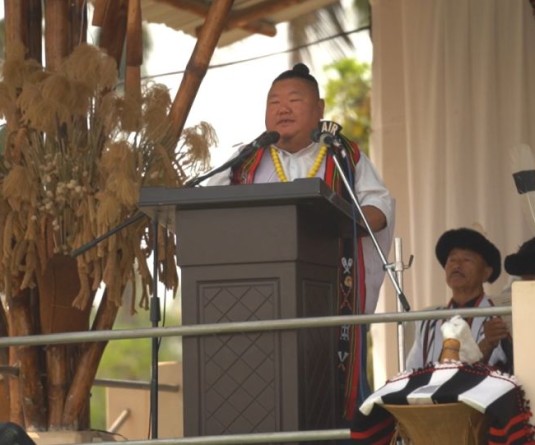
DIMAPUR, AUGUST 21 (MExN): The Kezekevi Thehouba (KTB) has said that the bid to push oil palm cultivation in the North East rings alarm bells with brands such as Godrej’s ‘Agrovet’, Patanjali’s ‘Ruchi Soya’ and 3F targeting to expand in the biodiversity-rich belt
A press release from the KTB informed that in Nagaland, oil palm plantation began in 140 hectares (ha) in 2015-2016, and exponentially grew to 4,623 ha by March 31, 2021. The organization held a virtual meeting on August 19 attended by 66 participants, including organizations from Assam, Arunachal Pradesh, Meghalaya, Mizoram and Nagaland to discuss the issue.
The meeting saw experts discuss the effects of introducing this new crop in a fragile eco-sensitive zone. The experts also received feedback on the arbitrary strategy adopted by the state government agencies to implement the National Mission on Edible Oil–Oil Palm (NMEO-OP), and the dealing of oil palm promoters with local farmers and landowners.
The interaction noted that each Oil Palm tree requires 230-328 litres of water daily, which means on a daily basis 32,830 to 46,900 litres of water will be required to irrigate 145 saplings of Oil Palm planted in one ha. In a region that is rain-fed with many areas facing dry spells in winter months, the NMEOOP has not spelt out how shortfall in water will be managed, it was stated.
Further, the meeting heard that evidence from Mizoram suggests that even after 15 years many farmers reported zero profit since the crop was planted. Most often this was because oil companies legally required to purchase the produce renegaded on agreements, citing poor road access to the farms. Some farmers also alleged that companies failed to pay compensation stipulated by the Mizoram government laws under the Mizoram Oil Palm (Regulation of Production and Processing) Act, 2004.
A similar incident of failed promises by oil palm promoters in lower Assam’s Goalpara district led to locals uprooting over 500 trees after a proposed milling factory remained a still-born project.
Farmers also said that oil palm crop has left their fields infertile and surrounding forests drained of its water table.
Experts have questioned both the ‘quantity’ and ‘quality’ of water that will be available for people since oil palm cultivation requires exorbitantly high use of fertilisers and pesticides.
The interaction mentioned issues associated with land usage pattern, procurement strategies and the potential impact on land ownership and tenure ship where oil palm cultivation is involved. The meeting focused on the shift in land tenure systems when oil palm comes into the picture. The experts shared how their studies have shown oil palm cultivation tends to shift land tenure from community-owned to privately held.
“This is a uniquely Northeast India problem, where due to special constitutional protections under the 6th Schedule or Article 371 series, land ownership and management are primarily in the hands of the community, with the strength of protective provisions varying in different states,” the KTB observed.
The meeting was also informed that replacing standing mixed forests with mono culture can invite complications.
Experts presented the scenario when landscapes with diverse benefits such as medicinal plants, timber, bamboo and non-timber forest products, diversity of food crops are replaced with labour intensive monoculture cash crop that will negatively impact food security.
Because oil palm cultivation requires large quantities of fertilizers and pesticides, the health of humans and water bodies can be severely compromised, the experts said.
They also warned that the impact of oil palm on the largely subsistence economy turning to a cash economy will result in negative growth. They expressed concern that many farmers have fallen prey to oil palm cultivation “because of sheer ignorance due to a lack of conversation around it.”
The KTB informed that in the NE, Meghalaya is the only state to have rejected palm cultivation by paying heed to its farmers’ suggestions. Villages resisted the lure of this new crop cultivation because it could undermine the means to live on their own land.
In his closing remark, Niketu Iralu, Chairman of KTB, pointed out in the context of the land-related violence in Manipur, natural resources in the region are closely linked with geo-political strategies of India’s Act East policy. Iralu explained the need to have access to information for communities to make informed decisions about their land and natural resources for a sustainable future.






